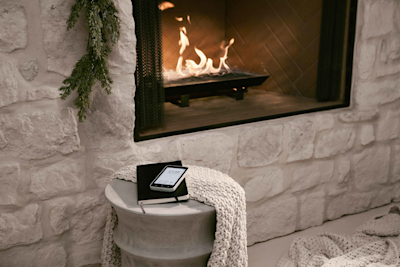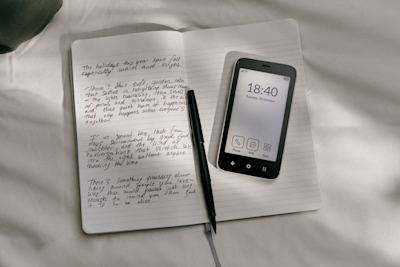
How Technology Affects Our Minds
How technology shapes our mind
Technology has always shaped the way we live, however in the last two decades, it has also begun to profoundly reshape the way we think, feel, and pay attention.
We once interacted with tools that were textured, colorful, and intuitive. Buttons had ridges, dials had resistance, and the more familiar we became with them, the easier they were to use without thought. Today, most of that richness has been flattened behind glass.
Instead of supporting us, modern devices often compete for our attention. They distract more than they assist. They feel less like trusted tools and more like demanding roommates. This shift may seem small on the surface, but it has a powerful effect on our cognition, emotions, and overall well-being.
At Mudita, we believe technology should work differently. Instead of pulling us away from real life, it should help us be more present for it. That’s why, by designing products that prioritize intentionality and respect human attention, we aim to restore balance in a world dominated by flat, distraction-heavy devices.
READ: How technology has upended the human experience
The Loss of Dimensionality
If you’re old enough, think about the difference between adjusting the volume on a stereo thirty years ago and adjusting it on your smartphone today. The stereo had a dial you could locate by touch alone, often with small ridges that allowed your hand to find the right spot without looking. You could turn it while still holding a conversation, cooking, or focusing on something else entirely.
On a smartphone, the action is hidden behind a flat touchscreen. You must look, tap, swipe, and confirm, pulling your eyes and mind away from whatever you were doing. Instead of becoming more intuitive over time, many modern devices feel less familiar the longer we own them. Software updates move functions around, icons change, and what was once second nature suddenly requires attention all over again.
This is part of what some describe as a “loss of dimensionality.” Surfaces have become smooth, environments have grown monotonous, and our daily interactions with tools have become flatter. Even the world around us reflects this shift: where cars once came in vibrant colors, today’s parking lots are seas of gray, black, and white.
Flatness might look sleek in an advertisement, however it often leaves us overstimulated and undernourished in daily life. Our hands, as much as our eyes, crave texture. Our minds thrive on variety and richness. When our environments lack this, we feel unsettled, like something is missing.
READ: Embracing Simplicity in Today's Tech-Driven World
What Our Minds Really Need
Human cognition did not evolve in front of screens. For most of history, our brains were shaped in dynamic, textured environments like forests, fields, and villages. These settings offered complexity and variation: the sound of leaves in the wind, the feel of bark under our hands, the sight of countless shades of green.
Our brains expect this kind of sensory richness. When it’s missing, we often feel anxious, restless, or drained. A flat touchscreen cannot replace the depth of walking through nature, just as a monochrome office with artificial light cannot provide the restorative energy of daylight streaming through a window.[1]
This is why we often feel unsatisfied after scrolling for hours, even if the experience seemed engaging in the moment. Social media feeds or mobile games provide quick bursts of stimulation with flashing colors, notifications, small rewards, however, they lack the depth and dimensionality our minds crave. In contrast, stepping outside, looking at a tree, or even touching a natural material like wood often leaves us feeling calmer and more grounded.
Psychologists sometimes distinguish between two types of time: Chronos time (measured by the clock, filled with tasks, deadlines, and digital interruptions) and Kairos time (immersive, meaningful moments when we lose track of the clock). Chronos time is what we experience when software updates interrupt our day or when notifications fragment our focus. Kairos time is when we fall into conversation with a friend, lose ourselves in a walk through the park, or watch the sun dip below the horizon.[2]
Technology should support Kairos time, not rob us of it.
READ: The Mudita Kompakt Solution to Digital Overload
Why Familiarity Matters
One of the most overlooked qualities of good design is familiarity. A tool should become easier, more natural, and more invisible the longer we use it. Think of a favorite chair that molds to your shape over time, or a musical instrument that feels like an extension of your body.
Unfortunately, many modern devices move in the opposite direction. Instead of becoming familiar, they become more confusing with time. Updates reconfigure layouts. Features multiply. What should feel like a trusted companion instead feels like something you must constantly relearn.
When design lacks familiarity, it forces our attention onto the tool itself instead of the task we want to accomplish. This adds cognitive friction, creating the mental equivalent of sandpaper with every interaction. Instead of flowing seamlessly, we are interrupted, again and again.
At Mudita, we see this as one of the great failings of mainstream technology. If devices are meant to support our lives, they should fade into the background. They should help us stay present, not demand our constant focus.
READ:
Mudita’s Approach to Mindful Technology
This philosophy shapes every product we design. Mudita’s goal is not to overwhelm with features, but rather to create technology that feels familiar, calming, and supportive.
Mudita Kompakt- More Offline, More Life
Mudita Kompakt: Our distraction-free phone is built around an E Ink display that’s gentle on the eyes and easy to read in sunlight. It includes essential tools without addictive apps, allowing users to stay connected without getting pulled into endless scrolling. Over time, it becomes a trusted companion, like something that fits naturally into daily life without demanding more attention than necessary.
Mudita Harmony: This mindful alarm clock is designed to protect your evenings and mornings from the pull of smartphones. With an E Ink screen, customizable sounds, and without sleep-disturbing blue light, it supports healthy sleep routines. It feels familiar and reliable by helping you start and end the day with intention.
Mudita Bell: A minimalist alarm clock that restores a simple, tactile ritual to waking up. No software updates, no notifications, just a reliable tool that supports your rhythm of life.
Mudita Harmony 2 & Mudita Bell 2
What connects all these products is intentional simplicity. They’re not about doing everything. They’re about doing the right things in the right way, so you can focus on what truly matters.
READ: How to Live Intentionally in a Fast-Paced World
Reclaiming Dimensionality in Daily Life
The effect of technology on our minds is profound, but it doesn’t have to be negative. When we choose tools that respect our attention and bring dimensionality back into our lives, we feel more at ease, more focused, and more alive.[3]
That doesn’t mean rejecting technology entirely. It means being selective about the devices we use, favoring those that support Kairos time, provide familiarity, and integrate seamlessly into daily life. It means seeking out texture and analog simplicity in our environments, in nature, and in the tools we choose.
By designing with intention, we hope to help people live more mindfully, with technology that fades into the background and allows life itself to come to the forefront.
Choosing Technology That Supports Life
Technology affects our minds in ways we don’t always notice. Flat, textureless devices demand more of our attention than we realize. Environments stripped of color, variety, and natural texture can leave us anxious or drained.
However, it doesn’t have to be this way. When we surround ourselves with tools and spaces that respect our attention, embrace texture, and grow more familiar with time, we thrive. We find ourselves in Kairos time more often, enjoying those moments of presence and joy that make life meaningful.
At Mudita, we believe technology should help us return to what matters most. Not more screens.
Not more distractions. Just mindful tools that support the richness of human life.
Related stories

7 Surprising Ways Smartphones Drift Into Our Relationships
How do smartphones weaken relationships without causing conflict? Explore the patterns of digital distraction, and how to choose presence over scrolling.

Starting the New Year with Fewer Distractions, Not More Tech
A gentle January reset. Start the new year with fewer distractions and learn how mindful tech use can support focus, rest, and more meaningful downtime.

What to Look for When Choosing a Minimalist Phone
Looking for the best minimalist phone? Learn which features matter most, what to avoid, and how Mudita Kompakt combines simplicity, focus, and mindful design.
If you'd like to receive the best stories from our blog, keep up to date with our progress and get notified about our product releases and special discounts.